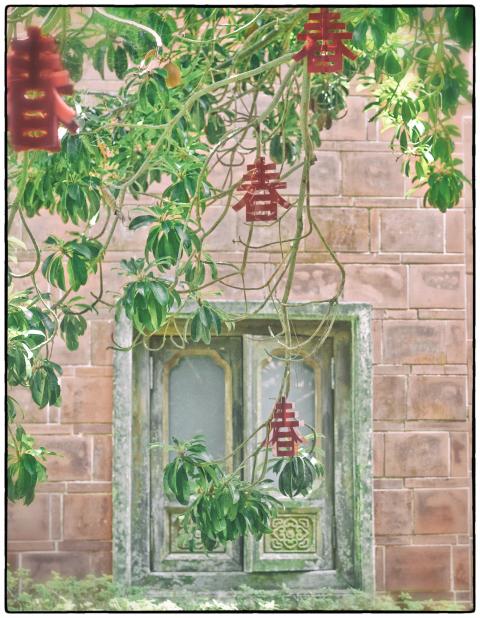Chinese Practice
春回大地
(chun1 hui2 da4 di4)

Photo: Paul Cooper, Taipei Times
照片:台北時報記者古德謙攝
Spring has returned
春回大地此成語源自於周紫芝所寫的宋詞:
樹頭雪過梅猶在
地上春回柳未知
梅於冬春季開花,因具有耐寒特性,傳統上與松、竹合稱為「歲寒三友」。詞中,「雪過梅猶在」表示嚴寒已過,梅花仍綻放。接著「地上春回」形容溫暖的天氣又回到人間,萬物逐漸復甦,不過尚未擴及柳樹。
這句成語用來形容冬天終於結束,從梅花仍開著而樹頭的雪已開始融化,人們可以看到春天來臨的徵兆。
英文中也有一個有趣的諺語“one swallow does not make a summer”,和這首宋詞有異曲同工之妙。在英文諺語中以燕子代替融雪,象徵新季節的到來。這句英文諺語以隱喻的方式提出警惕,字面意思為「看到一隻燕子不代表夏天就到了」:雖然出現改變的徵兆,並不代表情況已經改變。
(台北時報記者古德謙整理)
每逢三月,春回大地,庭院便開滿了花。
(Every March, spring returns, and the garden is bursting with flowers.)
英文練習
One swallow does not make a summer
The Chinese idiom 春回大地 comes from a poem written by the Song dynasty poet Zhou Zizhi:
樹頭雪過梅猶在
地上春回柳未知
The snow is gone from treetops
The plum blossom remains.
As spring returns to the ground below,
Still unaware, the willow.
Plum blossom generally opens in the late winter/early spring, and is traditionally regarded in Chinese culture as being one of the “three friends of winter,” along with the pine tree and bamboo.
This idiom is used to mean that the winter is finally over, and that we are seeing the first signs of the arrival of spring, as the plum blossom is revealed once again through the melting snow at the tops of the trees.
The English phrase, “one swallow does not make a summer” is similar in that it uses a sign — the swallow, instead of melting snow — to indicate the arrival of a new season. It carries a cautionary meaning, however: the first indications of change do not mean the change is complete.
It is the modern version of “It is not one swalowe that bryngeth in somer. It is not one good qualitie that maketh a man good,” from a collection of Greek and Latin proverbs compiled by the Dutch humanist Erasmus.
(Paul Cooper, Taipei Times)
Well, yes, he has been much more polite today. But one swallow does not make a summer.
(他今天確實比較有禮貌,但這不代表他已經改頭換面了。)

A: Which words ranked highest for Google Taiwan’s most searched words of 2024? B: No. 5 to 1 are: “US presidential election,” “Olympics,” “Ko Wen-je,” “typhoon” and “earthquake.” A: I heard that Google also released a list of most searched word meanings. B: Yeah, the most popular searches included “M3,” “APT” and “release without bail.” A: Let me google their meanings now. A: Google 2024 台灣搜尋排行榜,前幾名是什麼? B: 第5至1名是︰「美國總統大選」、「奧運」、「柯文哲」、「颱風」、「地震」! A: 我聽說Google還有一個搜尋字義的排行榜。 B: 對啊前幾名是︰「M3」、「APT」、「無保請回」。 A: 讓我搜尋一下他們是什麼意思。 (By Eddy Chang, Taipei Times/台北時報張聖恩)

Stonefish may not be the most impressive-looking animal in the sea. In fact, this fish is so skilled at camouflage that most people wouldn’t notice it if they swam past it. Despite their unremarkable appearance, stonefish are the most venomous fish in the ocean. Stonefish come in various shades of brown, red, yellow, and orange. Their rough skin texture and blotchy color pattern give them a remarkable resemblance to stones, which is where their name comes from. This feature helps them blend in with their surroundings exceptionally well. Stonefish are notable for their 13 highly venomous spines which protrude

Renhe sat stiffly at the Wei Ya banquet, picking at the symbolic dishes on the table. Fish for abundance, sticky rice cake for progress — it all seemed superstitious to him. The shrine to the Land God near the entrance, adorned with offerings, incense, and fruit, struck him as frivolous. “What does this have to do with running a business?” Renhe scrolled on his phone as his co-workers performed skits and poorly sung songs. He wasn’t even paying attention to the lucky draws when his name was called. The room filled with applause and cheers as he went to the stage

「雙手合十/合掌禮」(namaste) or 「碰肘/擊肘」 (elbow bump): 新冠肺炎流行逐漸改變現代社會的某些社交禮儀,歐美許多名人政要開始以「雙手合十/合掌禮」(namaste) 或「碰肘/擊肘」(elbow bump) 替代握手。 《今日商業》報導英國王儲查爾斯以「雙手合十」代替握手。 Coronavirus update: Prince Charles spotted greeting people with namaste (Business Today , March 12, 2020) 另外,《商業內幕》報導:疫情期間美國總統川普在白宮舉行新冠肺炎記者會,想和居家照護公司LHC集團執行副總葛林斯坦 (Bruce Greenstein) 握手,葛林斯坦婉拒,示意改用擊肘。 President Donald Trump attempted to shake hands with a home health care company executive . . . but the man turned the president down and offered him an elbow bump instead. (Eliza Relman, Business Insider , March 14, 2020) 「雙手合十/合掌禮」源自印度,也流行於泰、緬等國家。「碰肘/擊肘」則是 2006 禽流感、2009 豬流感後逐漸流行。疫情逐漸改變我們的生活方式,包括打招呼等社交禮儀,也出現了微妙的變化。 「拱手禮」(fist-and-palm salute) 至於華人社會傳統上也有雙手互握合於胸前「拱手禮」(fist-and-palm salute)。公益網站 Just Quarantine 提到: Taiwanese president Tsai Ing-wen demonstrating social distancing through use of a traditional Chinese greeting (fist & palm) instead of shaking hands in response to the COVID-19 pandemic. 因應新冠肺炎疫情,2020 當年總統蔡英文與來訪賓客保持安全距離,拱手 (fist &